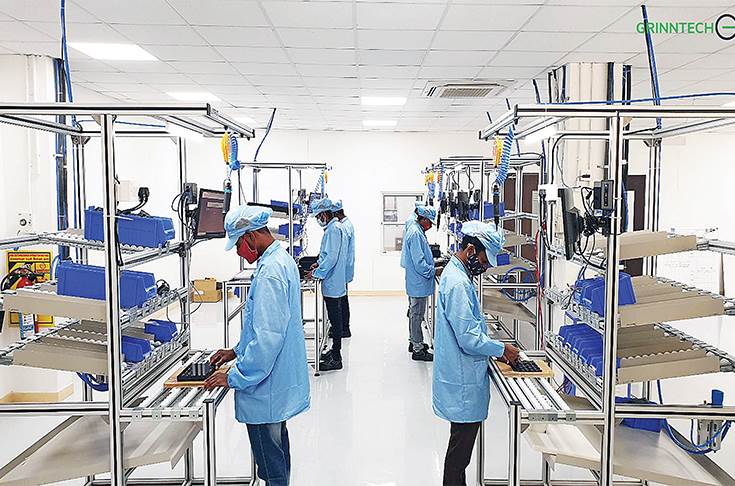After emerging from its incubator in the Indian Institute of Technology Madras Research Park in September 2020, Grinntech, an investor-backed start-up is now eyeing speedy growth. Specialising in lithium-ion batteries for EVs and energy storage systems, the company recently closed bridge funding round of US$ 2 million.
With adoption of electric vehicles beginning to take off in India, Grinntech has expanded its product lines focussing on a range of EVs including two- and three-wheelers and also farm-tractors / LCVs.
Founded by Nikhilesh Mishra and Puneet Jain, Grinntech has attracted industry leaders such as Dr V Sumantran, former vice-chairman of Ashok Leyland, and Lakshmi Narayanan, co-founder and former vice-chairman of Cognizant, as investors and to serve on its Board of Directors. Staffing is now in place and the new R&D and manufacturing facilities in Ambattur, Chennai employ 70 engineers and staff.
“The response has been in line with how we are placing our company. There are a lot of battery manufacturers but we hear (responses) from customers and others about the aesthetics and quality. People understand that our product is good, in terms of design, performance and reliability. We have got orders from the USA and we are also winning a lot of business in India too,” says Nikhilesh Mishra, co-founder and director.
He says the demand for tractor batteries is strong. “The power demanded in tractors is huge, even when run on diesel. It is similar in electric and there are a lot of challenges. We are winning a lot of orders from tractor OEMs, have started giving out samples to some and are in the process of production too. We are working with three tractor makers. We also have orders for two- and three-wheeler EV batteries for which production has commenced.”
The many lockdowns over the past year have impacted the development timeline for both Grinntech and its customers.
Battery weight reduction therapy
With the recent FAME II subsidy, EV makers are keen to source bigger batteries for the same price. A number of OEMs, who were earlier using 2kWh batteries, are now looking for 3kWh. This is a positive development, says Mishra, as this brings in more range. But he points out that Grinntech designs a battery based on specific product requirements else it could lead to mishaps.
“There are many who think they can cut corners by reducing weight to cut costs. We cannot just take something for granted and cut on parts to reduce battery weight. We have slightly changed the cell format. More companies are now changing to 21700. There is a weight reduction due it which is around 8-15 percent. This is not a big number and will be useful for two-wheelers. Maybe in the future, we will move to the level of the 4680 battery cells, which will give another 5-10 percent reduction. This is a constant development process,” he affirms.
New launches
The Chennai-based company has recently launched its new Finch and Monal series of batteries. It has also bagged a contract from a US-based manufacturer to develop a larger battery pack incorporating advanced thermal management utilising its proprietary battery management system.
Mishra says these batteries will also be introduced in the Indian market. Given the considerable traction electric three-wheelers are achieving in the fast-growing Indian market, it is not surprising that Grinntech is engaged in talks with original equipment manufacturers of these products and also LCV makers.
“These are the 48V and 60V batteries used for two-wheelers. Finch will have battery quality and will be available at a lesser cost. We have already covered 72V with Robin 72. These three together complete all the two-wheeler needs (for India) today. Going forward, we have started working with OEMs who have requirements for high-powered two-wheelers — 10-15 kW and providing performance similar to a 500cc motorcycle. These are of higher voltage — 120 to 144 V — and are designed and customised for manufacturers. Monal is for the autos which have higher speed and not the typical e-rickshaws.”
The company’s co-founder admits there is less traction on the electric CV front. While the Falcon battery is ready, tested and fully matured, the Hawk is in an experimental stage and the Pelican has been table tested. “It does not matter where the batteries go. Our customers can use our battery where they want and it is not going to affect their payload. The cargo segment is one area
where we foresee huge potential and our batteries suit their needs,” he says confidently.
Operations at the new manufacturing plant began in Q1 FY2022. A highlight of this facility is flexible manufacturing cells for multiple products, and Grinntech will be able to cater to demand of up to 400 MWh.
Going forward, with fresh funding in place, Mishra says this is the time for growth. “It will be multiplied growth. We are running a quarter late due to Covid-19 but things will now get better. Falcon and Hawk will be setting the pace for Grinntech in the coming days. Also, we now have a stable battery for electric light commercial vehicles. We are in conversation with many OEMs in India and abroad for new business,” he concludes on an optimistic note.
This feature was first published in August 1, 2021 issue.
/feature/iit-madrasborn-grinntech-sets-out-on-an-evcharging-mission-79955 IIT Madras-born Grinntech sets out on an EV-charging mission Tech-driven start-up has a range of lithium-ion batteries that promise to set new standards in electrical safety, energy density, durability, quality and reliability. https://www.autocarpro.in/Utils/ImageResizer.ashx?n=http://img.haymarketsac.in/autocarpro/db558e88-b252-4f69-940b-ef04976c4693.jpg
